
CANADIAN JOURNAL OF DIETETIC PRACTICE AND RESEARCH
Scope & Guideline
Innovating Nutrition Practices for Optimal Health Outcomes
Introduction
Aims and Scopes
- Public Health Nutrition:
Explores the relationship between nutrition, health outcomes, and community well-being, particularly in vulnerable populations such as Indigenous communities, immigrants, and older adults. - Dietetic Education and Training:
Investigates methods and frameworks for improving dietetic education, including the integration of cultural competence and experiential learning opportunities for students. - Food Security and Accessibility:
Examines issues related to food insecurity, affordability, and access to nutritious food, especially among marginalized groups and during crises like the COVID-19 pandemic. - Nutrition Interventions and Strategies:
Focuses on evaluating the effectiveness of various nutrition interventions and programs aimed at improving dietary practices and health outcomes across different demographics. - Cultural and Ethical Considerations in Dietetics:
Addresses the importance of cultural sensitivity and ethical frameworks in dietetic practice, especially in relation to Indigenous foodways and social justice. - Research Methodology in Dietetics:
Promotes rigorous research methodologies and the importance of evidence-based practice in dietetics, contributing to both academic knowledge and practical applications.
Trending and Emerging
- Indigenous Nutrition and Food Sovereignty:
Growing attention is being paid to Indigenous food systems and sovereignty, with studies examining the intersection of Indigenous identity, food security, and health outcomes. - Impact of COVID-19 on Nutrition Practices:
Research focusing on the effects of the COVID-19 pandemic on dietary habits, food security, and nutrition education has surged, reflecting the urgent need to understand and adapt to these unprecedented changes. - Mental Health and Nutrition:
There is an increasing focus on the relationship between mental health and nutrition, particularly in the context of eating disorders and the experiences of marginalized communities. - Sustainable Dietetics Practices:
Emerging themes include the exploration of sustainable food systems and practices within dietetics, as practitioners seek to align nutrition with environmental and social sustainability. - Cultural Competence in Dietetic Practice:
A significant trend is the integration of cultural competence in dietetic education and practice, ensuring that dietitians are equipped to serve diverse populations effectively.
Declining or Waning
- Traditional Dietary Guidelines:
There has been a noticeable decrease in papers focused solely on traditional dietary guidelines, as more emphasis is placed on holistic and culturally relevant approaches to nutrition. - Generalized Nutrition Education:
The focus on broad, generalized nutrition education has waned, giving way to more specific interventions tailored to unique populations, such as those with specific health conditions or cultural backgrounds. - Static Research on Food Products:
Research centered around static comparisons of food products or nutritional content has diminished, with a shift towards dynamic studies that incorporate behavioral, social, and environmental factors affecting dietary choices. - Single-Dimensional Health Outcomes:
The exploration of nutrition's impact on single health outcomes (e.g., obesity alone) is declining as research increasingly recognizes the multifaceted relationships between nutrition, mental health, and overall well-being.
Similar Journals

Revista Chilena de Nutricion
Advancing the Science of Nutrition in ChileRevista Chilena de Nutrición is a pivotal academic journal dedicated to the fields of nutrition and dietetics, published by the SOC CHILENA NUTRICION, BROMATOLOGIA & TOXICOLOGIA. With its long-standing history, from its inception in 1981 to its contemporary contributions, the journal serves as a crucial platform for the dissemination of research, insights, and advancements within the nutritional sciences. Although currently not listed as Open Access, its articles are accessible to a diverse audience, including researchers, healthcare professionals, and students, all keen on enhancing their understanding of nutrition science. The journal is ranked in the Q3 category in Food Science and Q4 in Nutrition and Dietetics for 2023, indicating its growing reputation and respectable position in the scholarly community. With Scopus rankings of #281 in Food Science and #106 in Nutrition and Dietetics, the Revista Chilena de Nutrición remains essential for those wishing to remain at the forefront of evidence-based nutritional research and practice.
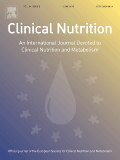
CLINICAL NUTRITION
Elevating Patient Outcomes through Evidence-Based NutritionCLINICAL NUTRITION, published by Churchill Livingstone, is a premier international journal dedicated to advancing the field of nutrition and dietetics, as well as critical care and intensive care medicine. Established in 1982, the journal has consistently delivered high-quality, peer-reviewed research, celebrated for its impact with an impressive Q1 ranking in both Critical Care and Intensive Care Medicine and Nutrition and Dietetics categories as of 2023. With its emphasis on collaborative discourse among researchers, clinicians, and educators, CLINICAL NUTRITION plays a crucial role in shaping dietary practices and interventions that enhance patient care and recovery. Although the journal does not provide open access, its rigorously curated content remains a vital resource for professionals seeking to implement evidence-based nutrition strategies in clinical settings. The journal is situated in the United States, with operations based out of Edinburgh, Scotland. Researchers are encouraged to engage with this influential publication to stay abreast of the latest findings and innovations within these intersecting fields.
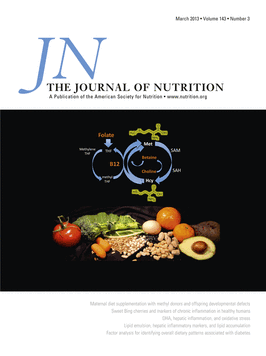
JOURNAL OF NUTRITION
Unveiling the science behind what we eat.JOURNAL OF NUTRITION is a premier academic journal published by Elsevier Science Inc, dedicated to advancing the understanding of nutritional science and its impact on health. With a long-standing tradition since its inception in 1945, the journal provides a vital platform for high-quality research, featuring articles that cover a wide range of topics within the fields of Medicine and Nutrition and Dietetics. Recognized for its significant contributions, the journal holds an impressive impact factor, with a Q1 rank in both Medicine (miscellaneous) and Nutrition and Dietetics as of 2023, positioning it among the top tier of scholarly publications in these disciplines. The Scopus Rankings further validate its status, boasting a rank of #57/398 in Medicine and #30/140 in Nutrition, indicating its influential presence in the research community. Although it operates under a traditional access model, the journal actively engages with a global audience of researchers, professionals, and students by disseminating cutting-edge insights designed to inform nutrition policy and practice. By focusing on current trends, innovative methodologies, and evidence-based nutrition strategies, the JOURNAL OF NUTRITION continues to be an essential resource for those committed to enhancing health through nutrition.
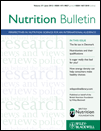
NUTRITION BULLETIN
Bridging Knowledge Gaps in Medicine and Dietetics.NUTRITION BULLETIN, published by Wiley, is a prestigious journal in the fields of Medicine and Nutrition and Dietetics, recognized for its impactful contributions since its inception in 1968. With an ISSN of 1471-9827 and an E-ISSN of 1467-3010, the journal has consistently addressed critical issues in nutrition science, public health, and dietary practices, making it an invaluable resource for researchers, professionals, and students alike. As evidenced by its position in the 2023 Q2 category rankings, it holds an impressive rank in both Medicine (miscellaneous) and Nutrition and Dietetics, boasting a 69th percentile in Scopus rankings. Though not an Open Access publication, NUTRITION BULLETIN offers a wealth of knowledge, including original research articles, reviews, and expert commentaries that foster innovation and dialogue in nutritional science. Its commitment to high-quality scholarship makes it an essential platform for advancing the understanding of nutrition and its vital role in health and disease, reflecting its significant impact within the academic community.
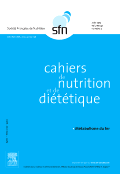
CAHIERS DE NUTRITION ET DE DIETETIQUE
Illuminating Trends in Health and Dietary ResearchCAHIERS DE NUTRITION ET DE DIETETIQUE, published by MASSON EDITEUR, is a prestigious journal in the fields of Nutrition and Dietetics, aiming to disseminate critical research and innovative practices from 1973 to the present. This journal serves as a platform for researchers, professionals, and students to explore key developments and emerging trends in the dietary sciences. Although currently classified in the Q4 quartile for both Medicine and Nutrition and Dietetics, its commitment to fostering academic discourse is evident through its rigorous publication process. With a focus on enhancing understanding of nutrition-related issues, CAHIERS DE NUTRITION ET DE DIETETIQUE remains an essential resource for anyone engaged in health and dietary research. Located in France, the journal continues to contribute to the scholarly community, despite the absence of Open Access options, making it a significant publication in its category.

Current Nutrition Reports
Empowering Knowledge in Nutrition and Dietetics.Current Nutrition Reports, published by SpringerNature, stands at the forefront of nutrition and food science research, providing an invaluable resource for researchers, professionals, and students alike. Since its establishment in 2012, the journal has gained recognition for its significant contributions to the field, achieving a prestigious Q1 ranking in both Food Science and Nutrition and Dietetics categories as of 2023. With an impact factor reflecting its critical position in the academic community, this journal is dedicated to disseminating high-quality reviews and reports that synthesize the latest findings on nutritional science, public health, and dietetics. Although it operates under a non-open access model, its extensive reach and influence in prominent databases like Scopus, where it ranks in the top percentiles, underscore its importance in shaping the future of nutrition research. As the journal anticipates converging years until 2024, it promises to remain a vital platform fostering scholarly dialogue and innovation in the dynamic realm of nutrition.
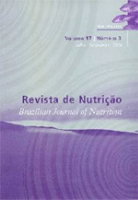
Revista de Nutricao-Brazilian Journal of Nutrition
Empowering Research to Transform Nutritional PracticesRevista de Nutricao-Brazilian Journal of Nutrition is a premier academic journal published by Pontificia Universidade Catolica Campinas, focusing on the diverse and critical field of nutrition and dietetics. With an ISSN of 1415-5273 and an E-ISSN of 1678-9865, this open-access journal has been committed to disseminating high-quality research since 1997, making it a valuable resource for researchers, professionals, and students interested in nutrition science. The journal is indexed in Scopus and currently holds a rank of #249/398 in Medicine (miscellaneous), reflecting its dedication to promoting impactful research. In the realm of Nutrition and Dietetics, it ranks #110/140, underscoring its relevance within the academic community. Located in Campinas, Brazil, the journal aims to enhance the understanding of nutritional practices and promote health-related solutions through rigorous peer-reviewed research, addressing the evolving challenges and trends in the field. As part of its objectives, it seeks to foster collaboration among researchers and contribute to the advancement of knowledge in both national and international arenas.

ARCHIVOS LATINOAMERICANOS DE NUTRICION
Innovating Nutrition Knowledge Across Latin AmericaARCHIVOS LATINOAMERICANOS DE NUTRICION, published by ARCHIVOS LATINOAMERICANOS NUTRICION, stands as a vital resource for professionals and researchers in the fields of nutrition and dietetics. Since its inception in 1971, this journal has dedicated itself to fostering the dissemination of knowledge across Latin America, with an emphasis on nutrition-related studies that cater to the unique dietary challenges of the region. The journal transitioned to an Open Access model in 2020, ensuring that valuable research remains widely accessible to scholars and practitioners alike. Although it currently holds a Q4 ranking in both Medicine (miscellaneous) and Nutrition and Dietetics, researchers will find a growing platform for sharing innovative findings that may impact public health strategies. With a commitment to advancing nutritional science and its practical applications, ARCHIVOS LATINOAMERICANOS DE NUTRICION invites contributions that align with its vision of promoting healthy eating practices across diverse populations.
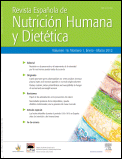
Revista Espanola de Nutricion Humana y Dietetica
Connecting researchers and practitioners in dietetics.Revista Espanola de Nutricion Humana y Dietetica is a pivotal open-access journal dedicated to advancing the study of human nutrition and dietetics. Published by the ASOC ESPANOLA DIETISTAS NUTRICIONISTAS in Spain, this journal has been making significant contributions to the field since its inception in 2011. With an ISSN of 2173-1292 and an E-ISSN of 2174-5145, it provides researchers and practitioners with a valuable platform for disseminating innovative research, case studies, and reviews related to nutrition science. Although currently ranked Q4 in both Food Science and Nutrition and Dietetics categories (2023), the journal is committed to raising its academic profile by fostering high-quality publications that address contemporary issues in nutrition. Open access since 2012, it ensures that research is readily available to a global audience, thus promoting the exchange of knowledge and best practices. Emphasizing the importance of dietary interventions and public health nutrition, the journal encourages contributions that bridge theory and practical applications, appealing to a broad spectrum of professionals, researchers, and students within the field.
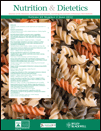
Nutrition & Dietetics
Transforming Dietary Knowledge into ActionNutrition & Dietetics is a premier peer-reviewed journal published by WILEY that serves as a key resource for researchers, professionals, and students in the fields of nutrition, dietetics, and public health. With its ISSN 1446-6368 and E-ISSN 1747-0080, the journal focuses on disseminating high-quality research that addresses contemporary issues in food science, dietary practices, and nutritional health. Ranked in the Q2 category in both Nutrition and Dietetics and Public Health for the year 2023, it enjoys an impressive standing within its scientific community, reflected in Scopus ranks placing it in the top percentile of its categories. Although not an Open Access journal, readers can access a wealth of knowledge from studies converging from 2006 to 2024. The journal's commitment to advancing evidence-based practices makes it indispensable for those engaged in bridging the gap between nutrition science and practical application, while it continues to evolve alongside emerging research and global health trends.